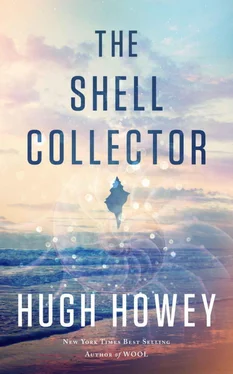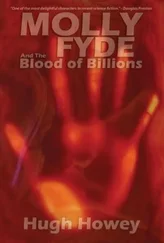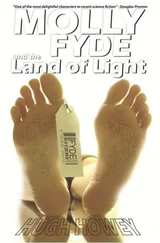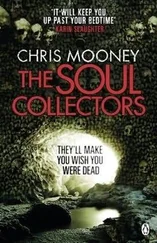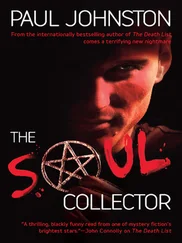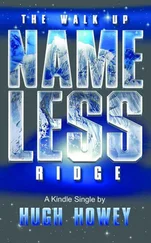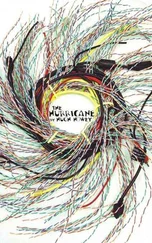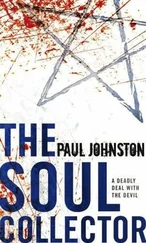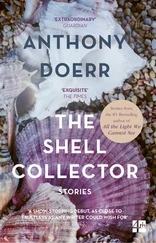“You can use mine.” He offers it. I consider the wisdom of calling Agent Cooper, filling him in, but I wave the phone away. The gesture is enough. To actually make that call would do more harm than striking him, I sense. Trust must be met with trust. Ness puts the phone away.
“This is my lead scientist,” he tells me, indicating one of the women I saw in the laboratory beneath the lighthouse. She’s standing with her hands in her smock, looking worriedly at Ness’s wound, then suspiciously at me. “Ryan, this is Maya Walsh. Maya, Ryan.”
We shake hands. She has a firm grip; she does not smile at me.
“And this is Stewart, my chief geneticist.”
Stewart is smoking an old-fashioned cigarette. I wonder if this is a habit he picked up from Vincent or vice versa. He exhales a cloud of smoke, then shakes my hand. “The reporter, eh?”
“Not today,” Ness says. “Today she is only a friend. I want you to show her around.”
I follow Ryan and Stewart down the stairs to the back entrance, through the locked door held fast by Holly’s birthday. Ness follows. Inside, the others kick off their shoes and don white booties. I take a pair from the cardboard box and pull them on too, realizing that only Ness and I are barefoot, that he must’ve kicked off his booties in pursuit. Twice I catch Ryan shooting Ness an Are you sure about this? look. And I catch him nodding almost imperceptibly. There is great risk in bringing me here, I realize. And it’s a risk he had planned on taking a week ago. With or without me, he has decided to blow the lid off his work here.
“We do most of our research on this floor,” Ryan says as we head down to the vast space I ran through earlier. “Genetic sequencing takes place over there. We examine samples from the vents, looking for base pairs that confer temperature and acidic advantages—”
“So they’re real,” I say. “These shells grow themselves. They’re not, like, transplanted in.”
It occurs to me that this might’ve been where Dimitri Arlov worked. Maybe he took the murexes home because he was proud of them, or simply because they were beautiful, or as a memento.
“Yes, they… grow themselves,” Ryan says, hesitating as though she’s reluctant to say more.
Ness interrupts. “Maya knows enough of the science to understand how this works,” he says. “Just explain it.”
Ryan shrugs at Ness and then turns to me. “They’re real, but we designed them. We have complete DNA samples of hundreds of extinct species. We use their nearest living ancestor to breed the first generation. And then we create enough genetic diversity for the species to become self-sustaining. Technically, it’s a new species, never seen before. But it looks the same. And it should fill the same niche. Should give us the biodiversity we’ve lost, which may trickle up the food chain.”
“Show her the murex,” Ness says.
Stewart nods and leads us down the next flight of stairs.
“What makes you think these animals will survive in the wild?” I ask.
“We have tanks on the lower level with live rock and water samples taken from various offshore locations,” Stewart explains.
“What about—?”
“Predators included,” Ness says behind me. He then pardons himself. He’s dying to talk, I can tell, but seems to want all this to come from someone else. He’s trying to be an observer, and I can tell that’s hard for him. While Stewart takes me toward the rows of tanks, I watch Ryan inspect Ness’s gashed cheek.
“I’ve seen the murexes,” I tell Stewart. I spot some knobby whelks in a tank a few rows down. Large shells. “What about those?”
“The whelks,” Stewart says. I follow him to the tank. He reaches inside and pulls one out. I watch the slug’s foot retract and swell to plug its home. “These were the fourth species we revived. They can already handle acidity levels plus eighty.”
“Plus eighty?”
“Eighty years out,” he explains. “Where we project the levels to be eighty years from now, anyway. It should give them plenty of time to adjust on their own. But if not, we can help them along again. Our command of this is only getting better.”
He passes me the shell. I touch the slug’s foot, feel it react to the stimulus, stiffen under my finger. I place the shell back in the water, lowering it to the bed of sand rather than dropping it. There are several tanks of this species. The digital thermometers against the glass show different temperatures, and notes are written in black wax right on the glass. I turn to ask Ness something and see Ryan dabbing Ness’s cheek with a rag, cleaning the wound I made. A pang of guilt laced with a twinge of jealousy courses through me.
“Why me?” I ask. And I realize that this is the question that has haunted me all week, from the guest house to the helicopter to the depths of the ocean floor to the beach. Why me? I wipe my wet hand on my shorts and close the distance between Ness and myself. “Why not show this to the scientific community? Publish a paper? Do a TV special on Discovery? Why would you show me? ”
“We need to win public support before any legal campaigns start,” Ness says. “We need the whole world on our side.”
“Who would be against this?”
I know as soon as I ask. Ness answers anyway.
“The same people who were against me before,” he says. “The same people who burned one of my father’s oil platforms. The ones who see any tampering with nature as bad, who have given up, who won’t be happy until we’re the ones who go extinct. And they’ll have people they normally hate on their side, the people who don’t believe in playing God. And of course, there are those who love shell collecting for the money and not the shells. They won’t support this either. Neither will those who get paid to crack down on operations like this.”
He’s right, of course. He’s absolutely right. About all of it. It’s just what he told me on the beach an hour ago.
“So who will support this?” I ask. “Politicians?”
All three of them laugh, and I hear how ridiculous this sounds. The lobbying will be fierce. And when did reason ever stand a chance in that game?
“The people who love the sea are our only hope,” Ness says. “And they tend to love quietly. They love in the middle of the night with their flashlights. They keep their love from others. But we need them to be loud. We need to win this all at once or we don’t stand a chance.”
I shake my head. Making my way to the stairs, I lower myself to the treads and sit down. “No,” I tell him. “No.”
Ness sits beside me. I can sense his desire to put a hand on my knee, realize that somehow this sort of gesture has become natural between us, but he resists the urge.
“You never stood a chance,” I say. “Not with me. Oh, Ness, what did you think I’d be able to do? Work a miracle for you? Get people to agree on this? Help get policies written by force of will, by some lyrical appeal to nature and love and life?”
The way he’s looking at me, I can tell that he did believe this. And the way Stewart and Ryan look piteously upon this man I think I love, I can tell that they told him so, that this was a fool’s errand from the start, the errand of a hopeful, romantic fool.
“That’s your grandfather,” I say. “Your grandfather had the right words, and he lived in the right time. He could have convinced his generation to undo what they’d done—“
“The science wasn’t ready,” Ness says.
“Well the people of our time won’t be ready. You’ll have the majority of hearts, Ness, but you won’t have much else.”
“Write the story,” he tells me. “Write the truth, and the rest will come.”
Читать дальше
